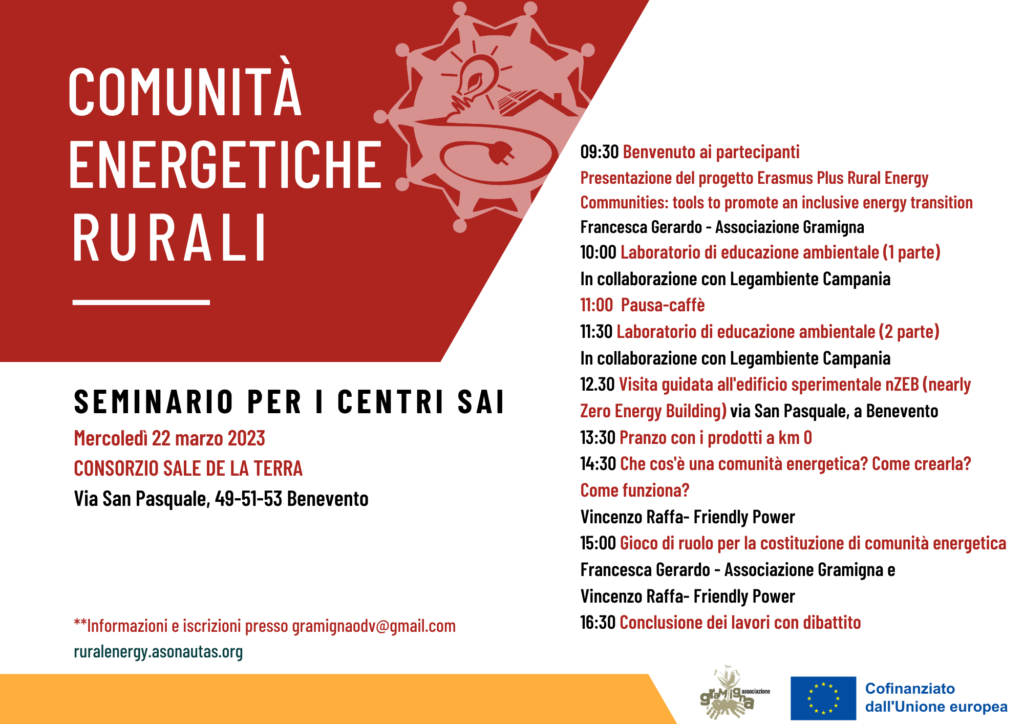
In December 2018, the European Union legislated on energy communities as part of the recast of the Renewable Energy Directive (RED II), providing them with rights that should ensure their role in the energy transition promoted by the European institutions. This directive should had been transposed into national law by the Member States by 30 June 2021, which is not yet the case in Spain, France and Italy.
Our vision is that, as soon as the general public is informed about the possibilities offered by energy communities and trained on how to create them, a faster energy transition will occur and the EU energy goals will be achieved.
This project aims to engage rural dwellers in the energy transition process of the European agenda, in line with the horizontal priority ‘Environment and Climate Change’, to raise awareness about the essential role energy communities can play in this transition, in line with the horizontal priority ‘Common Values, Civic Engagement and Participation’, and to provide training tools and know-how to increase knowledge about the structure, functioning and benefits of local energy communities in rural areas. As rural areas have differentiated energy needs, it is also an objective to identify potential energy consumption problems and production strategies that could enhance the rural environment, as well as to share the knowledge gained with our target groups. The reality is that in our rural communities, the concepts of energy transition and renewable energy communities are not yet widespread, if at all.
This is also true for us, where the project will work on areas with levels of depopulation, migration and gentrification in order to broaden the vision of what energy communities mean, in addition to the consumption and production of electricity, to other types of energy use such as heating or mechanical energy, in order to address the problems and resources involved (water reclamation, water supply, heating poverty, reforestation…).
In this context, we will set up a working group that will focus on rural energy issues, exchange good practices, strengthen the work of partners with specific experiences, etc.
In March, a workshop is planned to raise awareness among young people and migrant and non-migrant families living in the province of Benevento on the topic of energy communities.
The first step in establishing an energy community is to create a community of people, and this seminar aims precisely to bring together people who could potentially form an energy community.
The main objective of the workshop, in fact, is to promote social cohesion between the inhabitants of the same area with different cultural backgrounds by giving them the necessary tools to create a future energy community.
The activities of the workshop will be divided into two parts: the first dedicated to knowledge of correct behaviour to safeguard the environment, the correlation between the environment and people’s health, and reflection on the importance of not wasting natural resources; the second will focus exclusively on energy communities, to reflect on the environmental, economic and social advantages of such realities and to understand how they function and how they can be activated in the area.
Thanks to the work of experts specialised in environmental education participants will be actively involved in group dynamics and moments of active participation to promote the importance of energy efficiency in the home and domestic use ofgreen energy and to make people think about how more energy-efficient homes can reduce electricity bills and improve energy security.
There will then be a real simulation of all the steps necessary to set up an energy community through a role-playing game that will make them protagonists in all the steps of community creation.
Finally, a visit is planned at a nearly Zero Energy Building (nZEB) residential building in Benevento, which through the combined production of electricity and heat, in particular solar and geothermal energy, and a 100% hydrogen-fuelled fuel cell can meet the energy demands of the building that currently houses two female students from the University of Sannio
This is the first installation in Europe of a solid oxide fuel cell micro-cogenerator powered by pure hydrogen, on a real building. The initiative was made possible thanks to a collaboration within the Italian Association for Hydrogen and Fuel Cells – H2IT, between Stress and the Italian company Solid Power SpA.
The building was designed and constructed by STRESS and the University of Sannio as a full-scale demonstrator intervention of the SMART CASE research project ‘Innovative multifunctional solutions for the optimisation of primary energy consumption and indoor liveability in the building system’.
